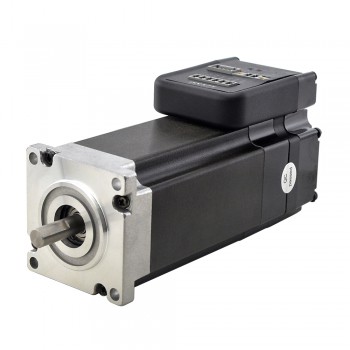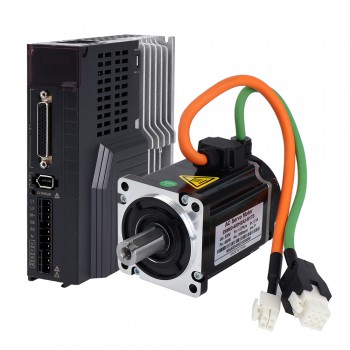1.Definition of servo motors
The definition of servo motors is an engine that controls the operation of mechanical elements in a servo system. It is an auxiliary motor indirect speed change device. The main function of a servo motor is to convert the input voltage control signal into the angular displacement and angular velocity output on the shaft to drive the control object. Its biggest feature is that it can rotate immediately when receiving the control signal and stop immediately when the signal disappears. The servo motor has the characteristics of small electromechanical time constant, high linearity, and starting voltage, and can convert the received electrical signal into angular displacement or angular velocity output on the motor shaft.
2.Classification of servo motors
1.DC servo motors are powered by a DC power supply and achieve precise control of the motor by controlling the current size and direction. It is usually composed of an armature, a magnetic pole, a permanent magnet or a winding. DC servo motors have high speed and torque, fast response speed, and high control accuracy. They are suitable for industrial automation fields with high-precision control, such as CNC machine tools, printing machines, packaging machines, etc. However, due to the presence of brushes and brush rings, long-term operation may cause brush wear, affecting the performance and life of the motor. 2. AC servo motors are powered by AC power and have high speed and torque. They are usually composed of permanent magnets and stator windings, and the speed and position of the motor are controlled by the frequency and phase of the AC power supply. AC servo motors have the characteristics of simple structure, brushless commutation, and long life, and are suitable for fields with high-precision control and high-power output, such as wind turbines, rail transportation, etc. In addition, AC servo motors also have good dynamic performance and anti-interference ability, and can meet the working requirements in various complex environments.
3.Common causes of servo motor alarms
1.Excessive load: When the load driven by the servo motor exceeds its carrying capacity, the motor will not work properly and may trigger an overload alarm. This may be caused by reasons such as excessive load itself, failure of the transmission mechanism or mechanical components.
2.Power supply problem: unstable power supply voltage or poor contact of the power supply line may cause the servo drive to alarm. Too high or too low power supply voltage will affect the output power and stability of the motor, which will lead to an alarm.
3.Control system problem: Improper parameter settings of the control system, control signal interference or control line failure may cause the servo drive to alarm. For example, improper parameter settings, abnormal control signals, etc.
4.Drive hardware failure: Damage to the power module, control board, sensor and other hardware inside the servo drive will also cause an alarm. For example, power transistor damage, encoder failure, etc.
5.Mechanical failure: Wear, looseness, and jamming of mechanical parts may also cause servo drive alarms. For example, bearing damage, insufficient lubrication, etc.

4.Selection principles of servo motors
1.Performance matching principle: The selection of servo motors must first meet the performance requirements of automation equipment, including output power, speed range, positioning accuracy, response speed and other indicators. When selecting, it is necessary to comprehensively consider the load characteristics, operating environment and working requirements of the equipment to ensure that the selected servo motor can meet the needs of actual applications.
2.Stability principle: The servo motor needs to have stable operating characteristics during work to ensure the stable operation of the automation equipment. Therefore, when selecting, it is necessary to pay attention to the output stability, temperature rise characteristics, anti-interference and other indicators of the servo motor, and select products with stable performance and high reliability.
3.Economic principle: On the premise of meeting performance and quality, the selection of servo motors also needs to consider cost factors. Engineers and technicians need to comprehensively consider factors such as the cost, maintenance costs, and energy consumption of servo motors, and select products with high cost performance to reduce the overall cost of automation equipment.
4.Reliability principle: As an important component of mechanical transmission, the reliability of servo motors is directly related to the stable operation of automation equipment. Therefore, when selecting, it is necessary to select products with reliable quality and stable performance to avoid using inferior products to damage the equipment.
5.Applicability principle: The selection of servo motors also needs to consider their scope of application and use environment, such as dust and water resistance, explosion-proof function, operating temperature range, etc. When selecting, it is necessary to select suitable products according to actual working conditions to ensure that the servo motor can work stably in a specific environment.
Source:https://steppermotor2.hatenablog.com/entry/2024/10/11/175540
